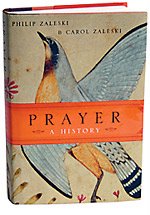
In Prayer: A History, Smith College professors Philip and Carol Zaleski take an unusually probing and thoughtful look at a topic that might otherwise seem to defy academic treatment.
The Zaleskis define prayer as "action that communicates between human and divine realms." They trace prayer across time and cultures and find it in expressions as diverse as the funerary rites of Neanderthals, the poetry of Emily Dickinson, the Sun Dance of the Cree Indians, and the admission by Alcoholic Anonymous members that they need the help of a higher power to stay sober.
They also distinguish between different types of prayers, such as those that ask for specific help ("the prayer of the refugee"), prayers that arise spontaneously at moments of crisis ("de profondis prayer"), and prayer that is part of a routine ("devotional prayer.")
The Zaleskis' treatment of their topic is sensitive. Nonbelievers will appreciate the fact that they don't argue for the efficacy of prayer. (They are, in fact, fairly negative about studies that purport to demonstrate a link between prayer and improved health.)
Those who do believe will enjoy the respectful - and occasionally even poetic - tone applied to the subject, as well as what appears to be a real understanding of the actual process. (Contemplative prayer is a "grueling enterprise," they point out, because the human mind, as capricious as a monkey "eagerly seizes any opportunity for woolgathering.")
2 comments:
I will be taking the medical boards at the end of this month, can I combine and use "the prayer of the refugee", "de profondis prayer" and "devotional prayer?"
I thought this oath and prayer (which first appeared in print in 1793 - and is attributed to Maimonides a Jewish philosopher of the Middle Ages) might in part be applicable!!
"...Should those who are wiser than I wish to improve and instruct me, let my soul gratefully follow their guidance; for vast is the extent of our art. Should conceited fools, however, censure me, then let love for my profession steel me against them, so that I remain steadfast without regard for age, for reputation, or for honor, because surrender would bring to Thy creatures sickness and death.
Imbue my soul with gentleness and calmness when older colleagues, proud of their age, wish to displace me or to scorn me or disdainfully to teach me. May even this be of advantage to me, for they know many things of which I am ignorant, but let not their arrogance give me pain. For they are old and old age is not master of the passions. I also hope to attain old age upon this earth, before Thee, Almighty God! ...."
The entire thing is here:
http://www.library.dal.ca/kellogg/
Bioethics/codes/maimonides.htm
PS. Combining everything - and lighting a bunch of candles to ward off evil spirits is also recommended!
PPS. You could always study too....
Post a Comment